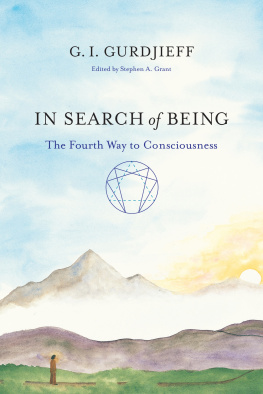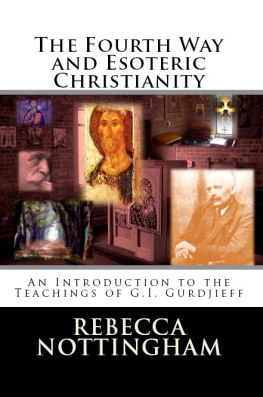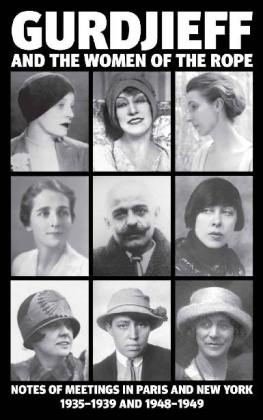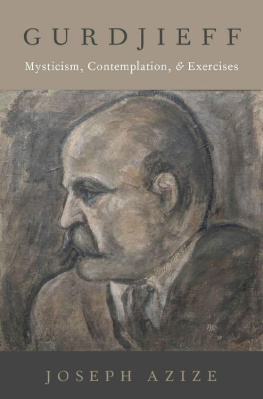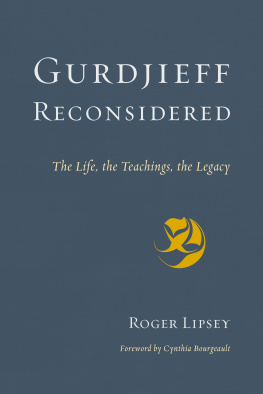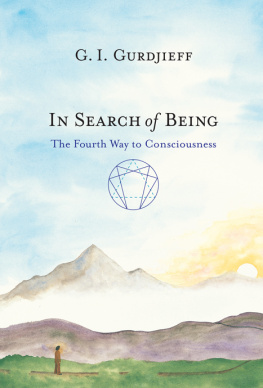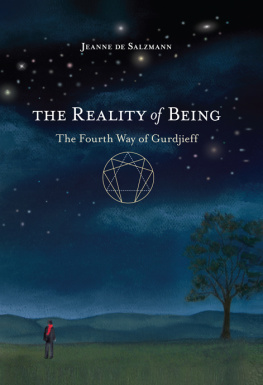G.I. Gurdjieff - In Search of Being: The Fourth Way to Consciousness
Here you can read online G.I. Gurdjieff - In Search of Being: The Fourth Way to Consciousness full text of the book (entire story) in english for free. Download pdf and epub, get meaning, cover and reviews about this ebook. year: 2021, publisher: Shambhala, genre: Religion. Description of the work, (preface) as well as reviews are available. Best literature library LitArk.com created for fans of good reading and offers a wide selection of genres:
Romance novel
Science fiction
Adventure
Detective
Science
History
Home and family
Prose
Art
Politics
Computer
Non-fiction
Religion
Business
Children
Humor
Choose a favorite category and find really read worthwhile books. Enjoy immersion in the world of imagination, feel the emotions of the characters or learn something new for yourself, make an fascinating discovery.
- Book:In Search of Being: The Fourth Way to Consciousness
- Author:
- Publisher:Shambhala
- Genre:
- Year:2021
- Rating:5 / 5
- Favourites:Add to favourites
- Your mark:
- 100
- 1
- 2
- 3
- 4
- 5
In Search of Being: The Fourth Way to Consciousness: summary, description and annotation
We offer to read an annotation, description, summary or preface (depends on what the author of the book "In Search of Being: The Fourth Way to Consciousness" wrote himself). If you haven't found the necessary information about the book — write in the comments, we will try to find it.
In Search of Being: The Fourth Way to Consciousness — read online for free the complete book (whole text) full work
Below is the text of the book, divided by pages. System saving the place of the last page read, allows you to conveniently read the book "In Search of Being: The Fourth Way to Consciousness" online for free, without having to search again every time where you left off. Put a bookmark, and you can go to the page where you finished reading at any time.
Font size:
Interval:
Bookmark:
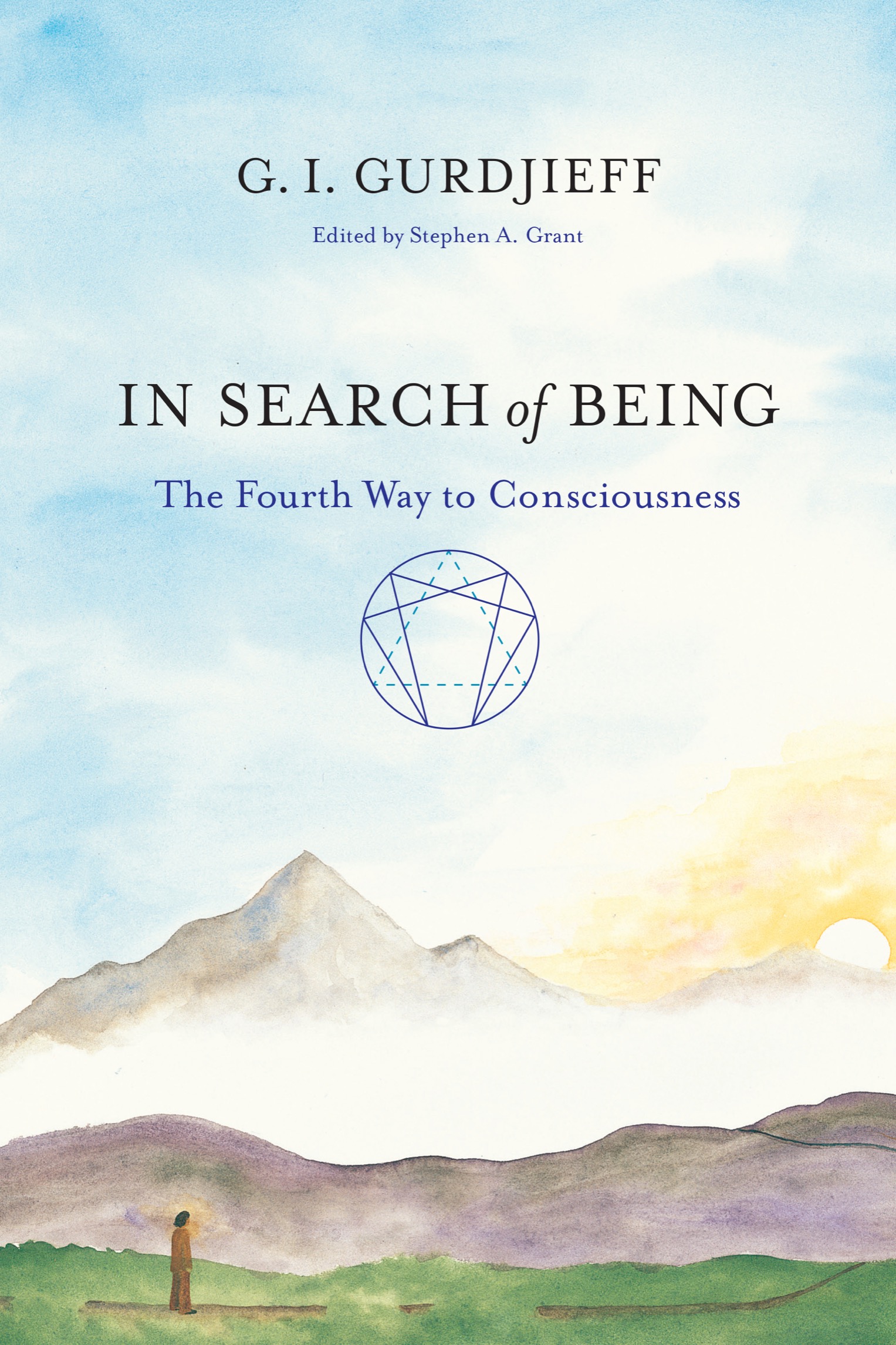
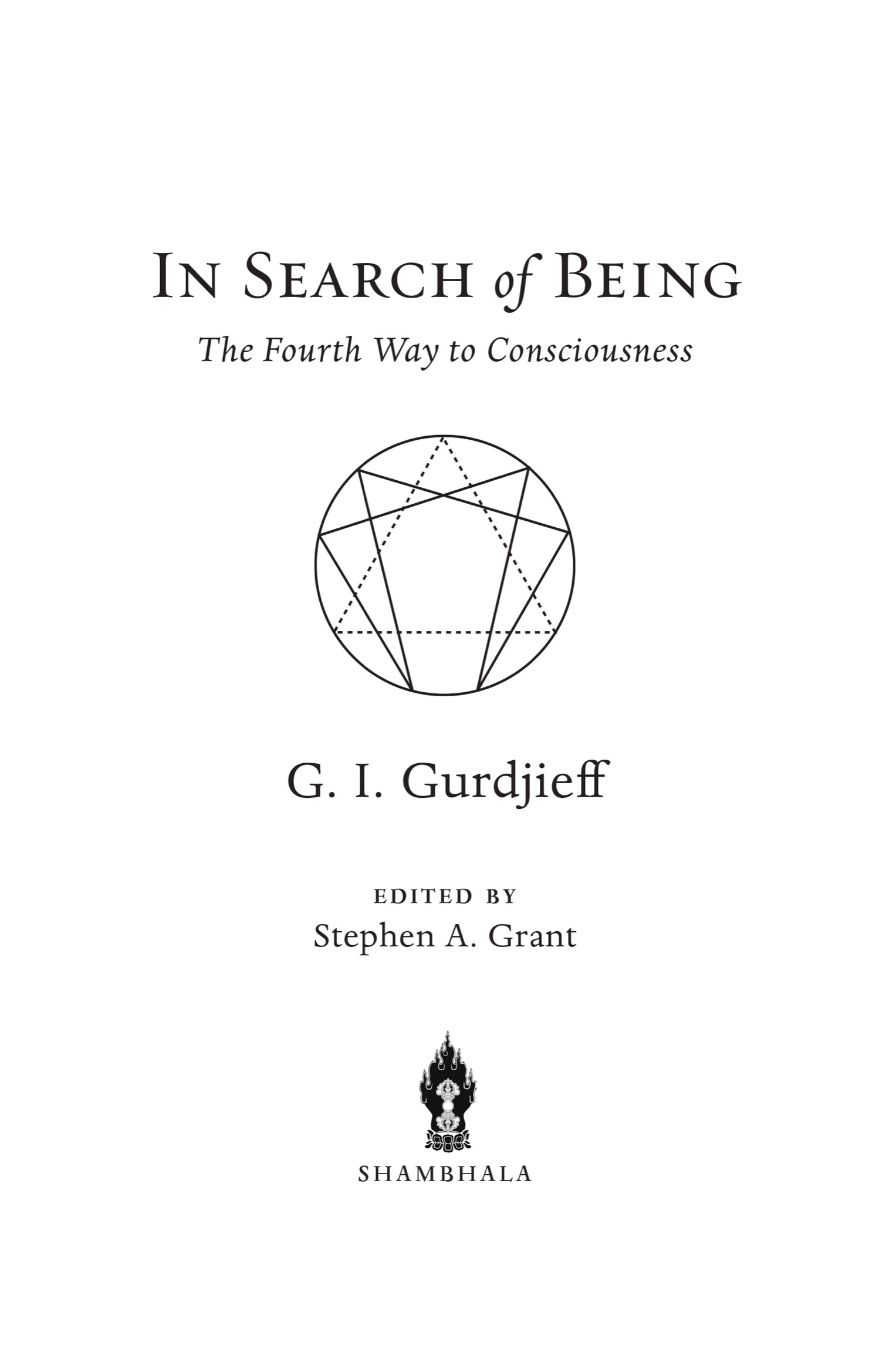
Shambhala Publications, Inc.
2129 13th Street
Boulder, Colorado 80302
www.shambhala.com
2012 by FourthWay Editions, Inc.
Edited by Stephen A. Grant, a senior member of the Gurdjieff Foundation, New York.
This edition published 2021.
Cover Art: The Road to Cold Mountain by Natasha de Castro
Interior Design: Lora Zorian
All rights reserved. No part of this book may be reproduced in any form or by any means, electronic or mechanical, including photocopying, recording, or by any information storage and retrieval system, without permission in writing from the publisher.
For more information please visit www.shambhala.com.
Distributed in the United States by Random House, Inc., and in Canada by Random House of Canada Ltd
T HE L IBRARY OF C ONGRESS CATALOGS THE HARDCOVER EDITION OF THIS BOOK AS FOLLOWS :
Gurdjieff, Georges Ivanovitch, 18721949.
In search of being: the fourth way to consciousness / G.I. Gurdjieff.1st ed.
p. cm.
Includes bibliographical references and index.
ISBN 978-1-61180-037-1 (hardcover: alk. paper)
ISBN 978-1-61180-082-1 (paperback: alk. paper)
eISBN 9780834843653
1. Fourth Way (Occultism) 2. Self-consciousness (Awareness) 3. Awareness. I. Title.
BP 605. G 8 I 5 2012
197dc23
2012026373
a_prh_5.7.0_c0_r0
O NE HUNDRED YEARS AGO in Russia, George Ivanovitch Gurdjieff (18661949) introduced an ancient teaching of mans conscious evolution, a forgotten science for perceiving reality in oneself and in the universe. Although he was virtually unknown during his lifetime, in the years after his death Gurdjieffs ideas have spread throughout the world, inspiring new generations of seekers to explore the esoteric meaning of traditional religions. Up to now, however, his early teaching has been reproduced only in fragments of talks from 1915 to 1924, arranged in chronological order; no attempt has been made to present this teaching in his own words as a comprehensive whole.
Gurdjieff regarded knowledge of realitywhat he called true knowledge of beingas a stream flowing from remote antiquity, passed down from age to age, from people to people, from race to race. He viewed this knowledge as the indispensable means to achieve inner liberation. For those seeking to understand the meaning of human life in the universe, he said, the aim of the search is to break through to this stream, to find it. Then there remains only to know in order to be. But in order to know, he taught, it is necessary to find out how to know.
Gurdjieff respected traditional paths toward spiritual transformation, and pointed out that their different approaches could be subsumed under one of three categories: the way of the fakir, which centers on mastery of the physical body; the way of the monk, based on faith and religious feeling; and the way of the yogi, which concentrates on developing the mind. He presented his teaching as a Fourth Way that requires work on all three aspects at the same time. Instead of obedience or faith, this way calls for knowing and understandingthe awakening of another intelligence. His personal wish, he once said, was to live and teach so that there should be a new conception of God in the world, a change in the very meaning of the word.
Born in 1866 in the Caucasus on the frontier of Russia and Turkey, from childhood Gurdjieff felt he had to understand the mystery of human existence, and delved deeply into religion and science to find some explanation. He found both approaches persuasive and consistent within themselves, but bound to reach contradictory conclusions, given the different premises from which they began. He became convinced that separately neither religion nor science could explain the meaning of human life. At the same time, Gurdjieff felt certain that a real and complete knowledge had existed in ancient times, and must have been handed down orally from generation to generation in various civilizations. He set out to find those who had this knowledge, traveling over a period of some twenty years. His journeys extended from Greece and Egypt to Central Asia, including the mountains of the Hindu Kush and Tibet.
With a small team of comrades, Gurdjieff found and put together elements of a forgotten knowledge that reconciled the great traditional beliefs. He called it ancient science but did not identify its origin or those who discovered it. This science viewed the world of visible matter as modern physics does, recognizing the equivalence of mass and energy, the subjective illusion of time, the general theory of relativity. But its inquiry did not stop there, accepting as real only phenomena that could be measured and proven by controlled experiment. This science also explored the mystics world outside sense perception, the vision of another reality, infinite beyond space and time. The aim was to understand the place of man in the cosmic order, the meaning of human life on the earth, and actually to know and experience in oneself the reality of both finite and infinite worlds at the same time. This science originated in civilizations in Central Asia and Egypt, and its principles were incorporated in all the traditional religions. Gurdjieff said it could be called esoteric Christianity, but noted these principles were developed thousands of years before Jesus Christ. It could also be called esoteric Buddhism, with its origin thousands of years before Gautama Buddha.
In 1912 Gurdjieff began to gather followers in Moscow and in 1915 organized a study group in St. Petersburg. Two years later, to escape the violence of the Russian Revolution, he moved to the Caucasus and eventually, in 1922, settled in France, where he established an institute to practice his teaching at the Chteau du Prieur in Fontainebleau near Paris.
As described in the biographical notes at the back of this book, the leading figure in the appearance of the Fourth Way was P. D. Ouspensky, who joined Gurdjieffs group in 1915 and went with him to the Caucasus. Ouspensky was no ordinary follower. Endowed with a far-ranging mind and keen intellect, he had traveled widely as a journalist investigating theosophical and other esoteric traditions. From his own experiences he was convinced of the possibility of higher consciousness. After failing to contact an esoteric school in India, he was seeking the hidden knowledge that Gurdjieff and his comrades had discovered. As a writer and lecturer, he was the ideal recruit to receive the teaching and promote the Fourth Way.
When he first met Gurdjieff, Ouspensky was immediately interested to learn what Gurdjieff knew about esotericism and schools that taught it. He liked Gurdjieffs clear and precise manner of speaking and, true to his journalistic profession, kept notes that recorded Gurdjieffs exact words, often in entire pages of quoted remarks. After helping Gurdjieff form a group in St. Petersburg, over a period of eighteen months, Ouspensky pressed him to reveal, step by step, the basic elements of his ancient science, which the group called the System. With Gurdjieffs permission, Ouspensky preserved his record of these talks and afterward arranged the material in an autobiographical manuscript entitled Fragments of an Unknown Teaching. In it he wrote that in 1921 he told Gurdjieff in detail of a plan I had drawn up for a book to expound his St. Petersburg lectures. He agreed to this plan.
Font size:
Interval:
Bookmark:
Similar books «In Search of Being: The Fourth Way to Consciousness»
Look at similar books to In Search of Being: The Fourth Way to Consciousness. We have selected literature similar in name and meaning in the hope of providing readers with more options to find new, interesting, not yet read works.
Discussion, reviews of the book In Search of Being: The Fourth Way to Consciousness and just readers' own opinions. Leave your comments, write what you think about the work, its meaning or the main characters. Specify what exactly you liked and what you didn't like, and why you think so.

